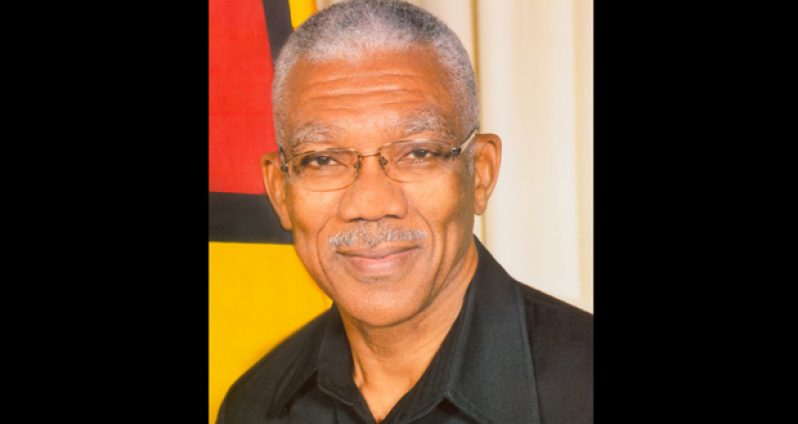– Granger maintains
By Ariana Gordon
NOTWITHSTANDING the revelations of impropriety, fraud and corruption unearthed in the many reports of audits conducted by the APNU-AFC coalition government over the past few months, Government will not participate in witch-hunting.During his weekly public programme, “The Public Interest”, President David Granger said while there has been evidence of much malpractice by persons who occupy or once occupied state posts, his government will move to the courts only when it is sure that the evidence in hand can withstand scrutiny.
“Although the audit reports have been accepted, and they point to malpractice, sometimes the evidence is not sufficient to bring prosecution in court,” the President Granger explained.
He noted that, in some cases, many of the persons found culpable of malpractice have left the country and are, often times, citizens of other countries.
“We have not embarked on extraditions because they are sometimes not warranted,” the President added.
Where the evidence is available, we would do prosecutions in the court. We don’t want to use those audits as a sort of tool for witch-hunting and dismiss people willy-nilly.
He made it clear that the function of the audits is to prevent recurrence of malpractice, corruption, and instances of fraud in the public sector.
“Where the evidence is available, we would do prosecutions in the court. We don’t want to use those audits as a sort of tool for witch-hunting and dismiss people willy-nilly,” he explained.
Notwithstanding this position, the President said he wants to ensure that those cases that the administration decides to place before the courts are successful prosecuted.
Thus far, the findings of twenty audits have been made public by the Ministry of Finance, and in every report presented to the Government, instances of malpractice and/or corruption have been found.
In the case of the Guyana Oil Company (GuyOil), auditor Nigel Hinds Financial Services discovered a “family affair.”
The auditor recommended that strong action be taken against the former Managing Director Badrie Persaud, who was fired in February because he had made decisions that were unauthorized.
According to the forensic audit report, Persaud entered into several transactions with close relatives, which reflected a strong conflict of interest.
The audit recommended that Persaud be “disciplined for non-disclosure of conflict of interest” — for awarding contracts to his brother and a nephew, and for abusing his authority and breaching the procurement policy. Persaud was fired at the end of February this year.
It was discovered that, over the period of review, Persaud had awarded transportation contracts worth $62M to his brother Indarjeet Persaud, and a construction contract valued at $860,000 to his nephew Avinash Persaud.
The audit found that apart from the initial sole-sourcing contract to Indarjeet Persaud, there were no subsequent contracts issued between GuyOil and Indarjeet Persaud, but he had continued to provide services beyond the stipulated contractual period, without any written agreement to so do.
Another side of the charge of conflict of interest was highlighted when Badri Persaud decided to become a candidate on the People’s Progressive Party Civic’s (PPP/C) national list for the May 11, 2015 General elections.
“Adherence to the decisions of a political party concurrent with managing a state-owned corporation creates conflict of interest issues that have negative implications for employee morale, use of (GuyOil) resources and the image of (GuyOil),” the audit report stated.
Similarly, in the case of the forensic audit into the operations of the Guyana Energy Agency (GEA), it was recommended that Chief Executive Officer (CEO) of the agency, Dr Mahender Sharma, be disciplined.
That audit, also conducted by Nigel Hinds Financial Services, said: “Strong disciplinary action should be taken against Sharma, CEO, for lax oversight of the fuel-marking system and (for) ensuing fuel-smuggling; (and for) his role in unlegislated and unauthorised polygraph testing of GEA employees from the Fuel Marking Services Division, (which) resulted in the services of over 30 employees being terminated.”
In the Audit Report, it was noted that there were several deficiencies in the Fuel Marking Division, and those deficiencies were as a result of “a weak internal control system.”
Revenue generated from fuel-marking services have averaged Gy$335,853,784 per year for the period 2011 to 2014, but there is a lack of proper validation of fuel marking reports prepared and issued by terminal staff of oil companies to the Marking Services Division (MSD) of the GEA for bulk fuel marked.
The fuel-marking reports are used to determine the quantity of fuel marked, so that fees can be calculated. Based on investigations by the auditor, it was discovered that the reports were “not independently validated by the MSD staff or by any officer of the vessel that delivered the fuel to the terminal.
“Prior to 2015, there is no documentation that Fuel Marking Services Division requested the Association of Trawlers and Seafood Operators to provide approved Guyana Revenue Authority (GRA) Custom forms before duty-free markers are dispensed from GEA stores to mark the fuel”, the report detailed.





.jpg)








